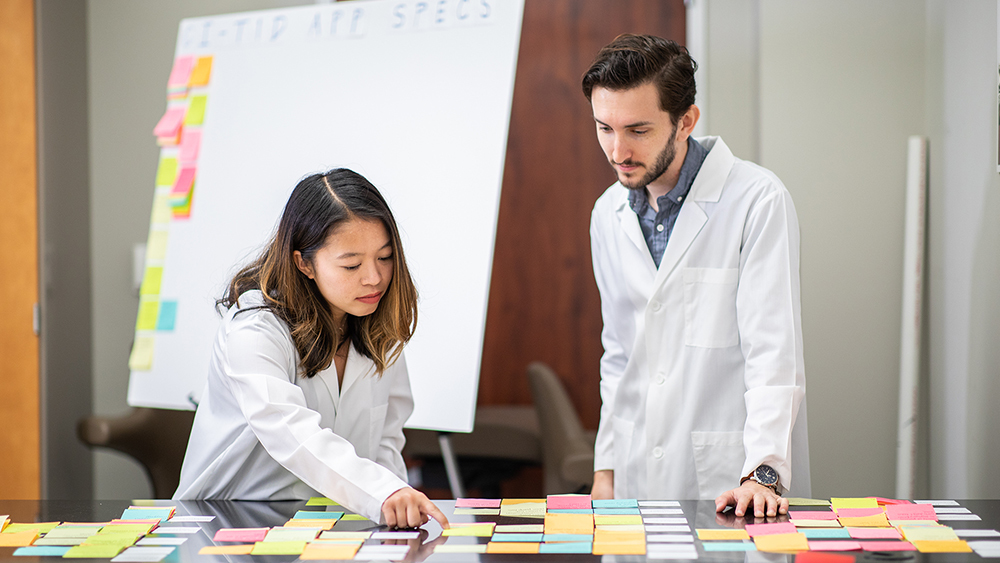
The unique Master of Engineering degree in the Department of Biomedical Engineering at Texas A&M University prepares students for careers with medical device companies. The industry-focused program provides students with a tailored curriculum and immersion experiences that lead to successful careers in industry, government and startup companies.
“The goal of the program is to prepare students to enter the biomedical device industry,” said Dr. John Criscione, co-director of the Bioinnovation Master of Engineering Program. “Our focus on industry is what makes our program unique.”
The program prepares students by combining industry-focused coursework with a comprehensive immersion experience in an industry or clinical setting. Students are paired with a faculty advisor who serves as a mentor to develop a tailored degree based on the student’s interest in different aspects of the biomedical product life cycle. Students can also pursue a Master of Business Administration as a dual degree or earn industry-related certificates in quality and regulatory engineering, project management or entrepreneurship.
“Our personalized approach not only provides students with an individualized educational experience, but it also assists them in career placement,” Criscione said. “In recent years, our industry placement rate has surpassed 90%.”
Industry-related curriculum
To ensure classes remain relevant to the industry, professors in the department work with leading medical device companies to develop course material. The department currently collaborates with international, national and local medical companies, including Medtronic, Abbott, Johnson & Johnson, Quest Medical and CardioQuip.
In addition to partnering with companies, the department currently employs eight professors of practice. These industry leaders bring real-world experience into the classroom and deepen the curriculum. They also serve as mentors, curriculum advisors and researchers to provide students with an industry perspective. John Hanks, a professor of practice in the department with more than 30 years of corporate experience at National Instruments, Maxim Integrated and Siemens Medical Systems, also serves as a co-director of the Bioinnovation Master of Engineering Program.
“This program isn’t an extension of an undergraduate degree,” Hanks said. “In addition to teaching, we coach students in career and industry development so that we can accelerate their success upon graduation.”
During their Master of Engineering program, students often work on projects in the hope of translating research into tangible medical devices that impact the lives of patients throughout the country. Professors of practice, faculty and staff assist students throughout the entire process, from idea to medical device, including finding funding for the projects. Two teams, comprised of master’s students and faculty mentors, recently won prestigious National Science Foundation (NSF) I-Corp entrepreneurship grants. Six additional student teams participated in the regional NSF I-Corp program to secure funding.
“There is so much knowledge about entrepreneurship in our department,” Hanks said. “Our students really get involved with translational research projects, which has led to great success in spinning out companies from our department.”
In recent years, faculty and students from the biomedical engineering department have turned numerous ideas into companies, including Visualase, an MRI-guided laser ablation system that was recently sold to Medtronic for more than $105 million; Shape Memory Medical, which has raised more than $20 million in venture funding; CorInnova, which has raised more than $15 million; and SageSpectra, which was started by a 2021 graduate of the Master of Engineering program.
Turning research into devices
Madi Heck, a 2021 graduate of the Master of Engineering program, co-founded SageSpectra with a device that detects early-stage peripheral artery disease (PAD). PAD is caused when arteries in an individual’s legs become narrowed. The early-stage disease is challenging to diagnose because nearly 75% of patients with PAD have no symptoms. If left untreated, the condition can lead to major complications, including leg amputation.
“Our focus has been to develop a device that gives a quick, easy and accurate screening for PAD,” Heck said. “The device painlessly evaluates tissue health in less than three minutes by using multiple wavelengths to measure tissue oxygen saturation, which is a key indicator of tissue health.”
Heck, who completed both a Master of Engineering and Master of Business Administration while at Texas A&M, worked on developing the device before launching the company upon graduation.
“The department is truly exceptional,” Heck said. “The professors, teachers and staff work really hard to provide a high-quality educational experience. Even while using a virtual platform during COVID-19, the education was outstanding.”
While Heck’s educational experience has been important to her success, she credits the department’s culture of mentorship and entrepreneurship for motivating her to launch SageSpectra. The company, which recently raised its first funding, also completed the Health Wildcatters Accelerator Program.
“Through the master’s program, I gained mentors and a mentality of entrepreneurship,” Heck said. “The department has a really unique culture. We try to solve real-world problems using engineering and then bring those ideas to market with the goal of helping people.”
Through its unique industry-focused Master of Engineering program, the Department of Biomedical Engineering at Texas A&M is preparing students for industry, translating research into devices and making a positive impact on the health of people around the world.